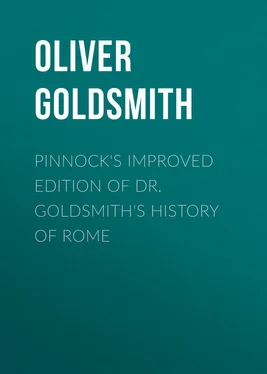Oliver Goldsmith - Pinnock's improved edition of Dr. Goldsmith's History of Rome
Здесь есть возможность читать онлайн «Oliver Goldsmith - Pinnock's improved edition of Dr. Goldsmith's History of Rome» — ознакомительный отрывок электронной книги совершенно бесплатно, а после прочтения отрывка купить полную версию. В некоторых случаях можно слушать аудио, скачать через торрент в формате fb2 и присутствует краткое содержание. Издательство: Иностранный паблик, Жанр: foreign_antique, foreign_prose, на английском языке. Описание произведения, (предисловие) а так же отзывы посетителей доступны на портале библиотеки ЛибКат.
- Название:Pinnock's improved edition of Dr. Goldsmith's History of Rome
- Автор:
- Издательство:Иностранный паблик
- Жанр:
- Год:неизвестен
- ISBN:нет данных
- Рейтинг книги:4 / 5. Голосов: 1
-
Избранное:Добавить в избранное
- Отзывы:
-
Ваша оценка:
- 80
- 1
- 2
- 3
- 4
- 5
Pinnock's improved edition of Dr. Goldsmith's History of Rome: краткое содержание, описание и аннотация
Предлагаем к чтению аннотацию, описание, краткое содержание или предисловие (зависит от того, что написал сам автор книги «Pinnock's improved edition of Dr. Goldsmith's History of Rome»). Если вы не нашли необходимую информацию о книге — напишите в комментариях, мы постараемся отыскать её.
Pinnock's improved edition of Dr. Goldsmith's History of Rome — читать онлайн ознакомительный отрывок
Ниже представлен текст книги, разбитый по страницам. Система сохранения места последней прочитанной страницы, позволяет с удобством читать онлайн бесплатно книгу «Pinnock's improved edition of Dr. Goldsmith's History of Rome», без необходимости каждый раз заново искать на чём Вы остановились. Поставьте закладку, и сможете в любой момент перейти на страницу, на которой закончили чтение.
Интервал:
Закладка:
Questions for Examination .
1. What political change has frequently resulted from improved military tactics?
2. Was Rome a military state?
3. Why are we led to conclude that the Romans considered cavalry an important force?
4. By whom was the phalanx instituted?
5. How was the phalanx formed?
6. What were the defects of the phalanx?
7. By whom was the legion substituted for the phalanx?
8. Of what troops was a legion composed?
9. What was a cohort?
10. What was the Roman form of battle?
11. In what manner was an army levied?
12. How was the sanctity of the military oath proved?
13. What advantages resulted from the Roman form of encampment?
14. How long was the citizens liable to be called upon as soldiers?
15. How was the army paid?
16. What power had the general?
17. On what occasion did the soldiers receive rewards?
18. How was the navy supplied with sailors?
19. What fact concealed by the Roman historians is established by Polybius?
20. How did the Romans form a fleet?
21. What were the several kinds of ships?
22. What naval tactics did the Romans use?
23. How did an ovation differ from a triumph?
24. Can you give a general description of a triumph?
CHAPTER VIII.
ROMAN LAW – FINANCE
Then equal laws were planted in the state,
To shield alike the humble and the great. — Cooke .
1. In the early stages of society, little difficulty is felt in providing for the administration of justice, because the subjects of controversy are plain and simple, such as any man of common sense may determine; but as civilization advances, the relations between men become more complicated, property assumes innumerable forms, and the determination of questions resulting from these changes, becomes a matter of no ordinary difficulty. In the first ages of the republic, the consuls were the judges in civil and criminal matters, as the kings had previously been; 43 43 Niebuhr, however, is of opinion, that judicial officers were elected by the "comitia curiata," from the earliest ages.
but as the state increased, a new class of magistrates, called prætors, was appointed to preside in the courts of law. Until the age of the decemvirs, there was no written code to regulate their decisions; and even after the laws of the twelve tables had been established, there was no perfect system of law, for the enactments in that code were brief, and only asserted a few leading principles. 2. The Roman judges did not, however, decide altogether according to their own caprice; they were bound to regard the principles that had been established by the decisions of former judges; and consequently, a system of law was formed similar to the common law of England, founded on precedent and analogy. In the later ages of the empire, the number of law-books and records became so enormous, that it was no longer possible to determine the law with accuracy, and the contradictory decisions made at different periods, greatly increased the uncertainty. To remedy this evil, the emperor Justinian caused the entire to be digested into a uniform system, and his code still forms the basis of the civil law in Europe.
3. The trials in courts refer either to the affairs of the state, or to the persons or properties of individuals, and are called state, criminal, or civil trials. The two former are the most important in regard to history.
4. The division of the Roman people into two nations, made the classification of state offences very difficult. In general, the council of the patricians judged any plebeian who was accused of conspiring against their order; and the plebeians on the other hand, brought a patrician accused of having violated their privileges before their own tribunal. 5. Disobedience to the commands of the chief magistrate was punished by fine and imprisonment, and from his sentence there was no appeal; but if the consul wished to punish any person by stripes or death, the condemned man had the right of appealing to the general assembly of his peers. 44 44 This privilege was conceded to the plebeians by the Valerian law, but must have been possessed by the patricians from the earliest times; for Horatius, when condemned for the murder of his sister, in the reign of Tullus Hostilius, escaped by appealing to the comitia curiata. The Valerian law had no sanction, that is, no penalty was annexed to its transgression; and during the two centuries of patrician usurpation and tyranny, was frequently and flagrantly violated. On this account the law, though never repealed, was frequently re-enacted.
6. To prevent usurpation, it was established that every person who exercised an authority not conferred on him by the people, should be devoted as a victim to the gods. 45 45 The formula "to devote his head to the gods," used to express the sentence of capital punishment, was derived from the human sacrifices anciently used in Rome; probably, because criminals were usually selected for these sanguinary offerings.
This, was at once a sentence of outlawry and excommunication; the Criminal might be slain by any person-with impunity, and all connection with him was shunned as pollution. 7. No magistrate could legally be brought to trial during the continuance of his office, but when his time was expired, he could be accused before the general assembly of the people, if he had transgressed the legal limits of his authority. The punishment in this case was banishment; the form of the sentence declared that the criminal "should be deprived of fire and water;" that is, the citizens, were prohibited from supplying him with the ordinary necessaries of life.
8. In all criminal trials, and in all cases where damages were sought to be recovered for wrongs or injuries, the prætor impanelled a jury, but the number of which it was to consist seems to have been left to his discretion. The jurors were called ju'dices, and the opinion of the majority decided the verdict. Where the votes were equal, the traverser or defendant escaped; and when half the jury assessed damages at one amount, and half at another, the defendant paid only the lesser sum. In disputes about property, the prætor seldom called for the assistance of a jury.
9. The general form of all trials was the same; the prosecutor or plaintiff made his complaint, and the defendant was compelled either to find sufficient bail, or to go into prison until the day of trial. On the appointed day, the plaintiff, or his advocate, stated his case, and proceeded to establish it by evidence; the defendant replied; and the jury then gave their verdict by ballot.
10. In cases tried before the general assembly of the people, it was allowed to make use of artifices in order to conciliate the popular favour. The accused and his friends put on mourning robes to excite pity; they went into the most public places and took every opportunity of showing their respect for popular power. When Cicero was accused by Clo'dius for having illegally put to death the associates of Cataline, the entire senatorian rank changed their robes to show the deep interest they felt in his fate. At these great trials, the noblest specimens of forensic eloquence were displayed by the advocates of the accuser and the accused; but the decisions were usually more in accordance with the spirit of party than strict justice.
11. The accused, however, might escape, if he could prevail on any of the tribunes to interpose in his behalf, or the accuser to relinquish his charge; if unfavourable omens appeared during the trial, it was usually adjourned, or sometimes the accusation withdrawn; and up to the very moment of the commencement of the trial, the criminal had the option of escaping a heavier penalty by going into voluntary exile.
Читать дальшеИнтервал:
Закладка:
Похожие книги на «Pinnock's improved edition of Dr. Goldsmith's History of Rome»
Представляем Вашему вниманию похожие книги на «Pinnock's improved edition of Dr. Goldsmith's History of Rome» списком для выбора. Мы отобрали схожую по названию и смыслу литературу в надежде предоставить читателям больше вариантов отыскать новые, интересные, ещё непрочитанные произведения.
Обсуждение, отзывы о книге «Pinnock's improved edition of Dr. Goldsmith's History of Rome» и просто собственные мнения читателей. Оставьте ваши комментарии, напишите, что Вы думаете о произведении, его смысле или главных героях. Укажите что конкретно понравилось, а что нет, и почему Вы так считаете.











